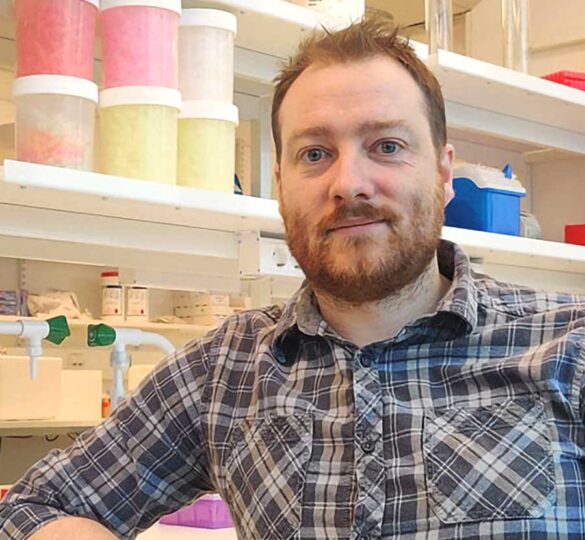2021 Shaffer Prize for Innovative Glaucoma Research Awarded to Pete Williams, PhD
The Shaffer Prize, presented annually by Glaucoma Research Foundation, recognizes a researcher whose project best exemplifies the pursuit of innovative ideas in the quest to cure glaucoma.

Pete Williams, PhD from the Karolinska Institutet in Stockholm, Sweden was awarded the 2021 Shaffer Prize for Innovative Glaucoma Research for his research project “Targeting Neuronal Mitochondria for Neuroprotection in Glaucoma.”
Dr. Williams’s research project investigated therapeutic strategies that target the optic nerve to treat glaucoma. “There are no treatments for glaucoma that directly target the retina and the optic nerve,” Dr. Williams said. “The only treatments that we currently have manage intraocular pressure.”
His 2019 research project funded by Glaucoma Research Foundation with a $50,000 grant allowed his laboratory to study metabolic changes within neurons and mitochondrial changes in retinal ganglion cells to discover therapeutic strategies in models of glaucoma that could later be translated to helping human patients in the clinic. “I’m motivated every day to perform truly translational research that we can take from our lab and walk it across the corridors into the clinic,” he said.
“The research from Dr. Williams’s team at the Karolinska Institutet is essential because it focuses on finding non-IOP-lowering treatments for glaucoma,” said Thomas M. Brunner, President and CEO, Glaucoma Research Foundation. “Glaucoma Research Foundation is pleased to recognize Dr. Pete Williams and his team of innovative researchers with the 2021 Shaffer Prize.”
The Shaffer Prize for Innovative Glaucoma Research was established in 2007 to honor the late Robert N. Shaffer, MD, a co-founder of Glaucoma Research Foundation.
Video Transcript
Pete Williams, PhD: It’s a huge honor to receive the Shaffer Prize for Innovative Glaucoma Research. It means so much as an indication of the important work that we’re doing, but also an indication of how important we see translational research for glaucoma, how we see what we can take and learn in animals and apply to the human condition.
I’m ideally situated at the Karolinska Institute, but also within St. Erik’s Eye Hospital in Sweden. St. Erik’s is one of the largest eye hospitals in Europe. And every day I get to see the benefit of what research can do to help ophthalmic patients in general, but also glaucoma patients. I can see the underserved need of glaucoma research and glaucoma clinical work. I’m motivated every day to perform truly translational research that we can take from our lab and walk it across the corridors into the clinic.
There are no treatments for glaucoma that directly target the retina and the optic nerve. The only treatments that we currently have manage intraocular pressure. Unfortunately, too many patients already have low pressures or are refractory to pressure lowering treatments. So we need new translatable strategies to target glaucoma directly. The research that we’ve been able to do with Glaucoma Research Foundation funding has allowed us to explore the therapeutic benefit of a novel oral drug to treat glaucoma that is not reliant on intraocular pressure.
The response we’ve had both from the clinicians and the patients has been phenomenal. Patients, at least here, have been so excited to think about something additional that they have in their arsenal to combat this insidious sight thief. To me, this makes me extremely happy that we’ve been able to benefit just the patient at the individual level, to give them some level of hope and excitement.
I truly believe that glaucoma research funding is underrepresented and underfunded in our current climate. The research grant that I received from the Glaucoma Research Foundation is a huge benefit in determining whether we can push these exciting projects forwards and take these discoveries from the bench to the bedside.
Without this funding from the Glaucoma Research Foundation, I wouldn’t have been able to generate sufficient preliminary data, either to have achieved the large external grants that I got, or to initiate the clinical trials which we have now received funding for. I truly believe that we’re on the cusp of developing very realistic, close, imminent translatable treatments for glaucoma. Thank you again for this honor. I am truly eternally grateful.
Published on February 1, 2021 / Reviewed on September 28, 2021